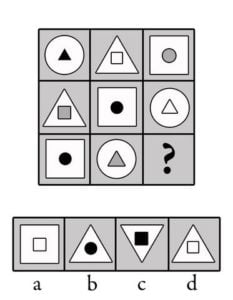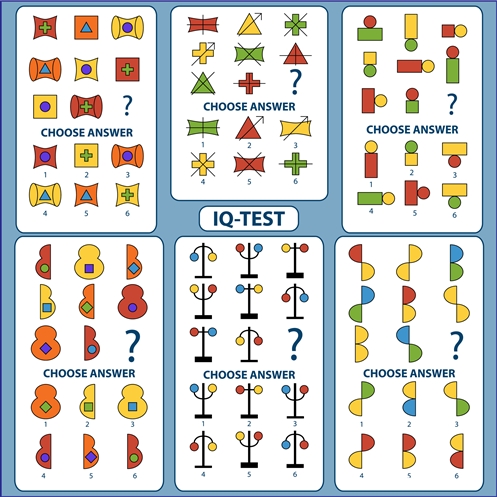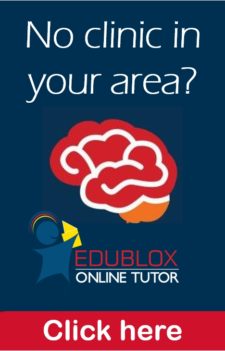
In order to explore this question, it is important to consider what the consensus is amongst psychologists on how the term intelligence can be defined. In simple terms, intelligence is a person’s ability to solve problems. There are two main types of intelligence according to this field of study:
- Verbal intelligence is the ability to analyse information and solve problems using language-based reasoning. Language-based reasoning may involve reading or listening to words, conversing, writing, or even thinking. From classroom learning to social communication to texting and email, our modern world is built around listening to or reading words for meaning and expressing knowledge through spoken language.
. - Non-verbal intelligence is the ability to analyse information and solve problems using visual or hands-on-reasoning. In other words, it is the ability to make sense of and act on the world without necessarily using words.
.
Although IQ tests certainly are one of the most popular ways to measure intelligence, it’s important to note that these tests should ideally be administered by a psychologist. Let’s look a little bit deeper than the popular culture understanding of the IQ test.
IQ tests explained
A full-scale IQ score in the range of 90 to 110 is considered average; and a person can be said to have average intelligence. Half of the population have IQs of between 90 and 110, while 25 percent have higher IQs and 25 percent have lower IQs.
In addition to looking at the full-scale score, the following three individual scores can also be compared:
- Verbal IQ measures acquired knowledge, verbal reasoning, and comprehension of verbal information. Below is a question that would require verbal reasoning ability:.
Butcher is to knife as hairdresser is to
a.) scissors
b.) hair
c.) curls
d.) blond
Answer: a
- Non-verbal IQ (also called performance IQ) measures a person’s non-verbal reasoning, spatial processing skills, attentiveness to detail, and visual-motor coordination skills. Below is a question that would require non-verbal reasoning ability:
Answer: d
- Full-scale IQ
.
What is expected in most people, is that the three scores will cluster close enough together to indicate that the individual’s verbal and non-verbal skills are evenly developed. When there is a large difference between verbal and non-verbal scores, it may indicate a learning difficulty or impairment of some kind. For instance, a non-verbal learning difficulty (NVLD) is usually suspected when a child demonstrates a verbal IQ that is 20 or more points higher than their non-verbal IQ. Low non-verbal IQ, relative to verbal IQ, is also associated with reported hyperactivity in children.
Non-verbal IQ increase through educational intervention
Edublox specialises in multisensory educational interventions aimed at developing and automatising the foundational skills of reading, spelling, mathematics and learning through cognitive development training.
Dr Wynand de Wet, today a veteran educational psychologist, did his practical research for a Master’s degree in Educational Psychology at a school for the deaf in 1987. The subject of his research project concerned the optimisation of intelligence. The group who were exposed to the Edublox cognitive development program were tutored simultaneously for 27.5 hours between April and August of that year, and showed an increase of 11.625 in performance IQ (deaf people can only be assessed on non-verbal IQ).
Our own more recent trials also confirmed that Edublox increases IQ, especially non-verbal IQ. In one experiment, the IQs of ten youngsters with severe learning difficulties were tested before starting on the program, and again after receiving 40 hours of one-on-one instruction. Their ages ranged between 7 and 18. The average verbal IQ score increased from 85.4 to 91.0, the average non-verbal IQ score from 92.6 to 105.1, and the average full-scale IQ from 87.0 to 97.1.
Effect of long-term Edublox training on non-verbal IQ
A wonderful Edublox success story in terms of IQ increase is that of Mia*, a young girl who started at Edublox two years ago. She was diagnosed as mildly dyslexic, performed poorly in all school subjects, and was on the verge of failing Grade 4. While her academic progress is consistent with that of other Edublox students (she no longer struggles academically), her case is noteworthy due to the big discrepancy that existed between her verbal IQ and non-verbal IQ — a full 24 points!
Before she started at Edublox in 2015, she was assessed by her school psychologist. Her verbal IQ was 96, which is average, while her non-verbal/performance IQ was a mere 72, which can be described as borderline intellectual functioning. Her full-scale IQ was 84 (low average).
Fast forward to November 2017. After attending Edublox for two years (approximately 240 hours), her IQ was re-assessed by the same psychologist. Her verbal IQ was now 100, which is average, while her non-verbal/performance IQ has increased by 25 IQ points to 97! Her full-scale IQ is 98 (average).
Although there are many myths around IQ, the Edublox team believes that cognitive training intervention can genuinely have a positive effect on a person’s ability to solve problems, or their intelligence. We encourage parents to keep abreast of new research in the field and to investigate educational interventions that may make a difference when they receive disappointing assessment results or IQ scores. Mia is a shining example of a student who changed her academic trajectory through hard work and the right help!
* Name has been changed









